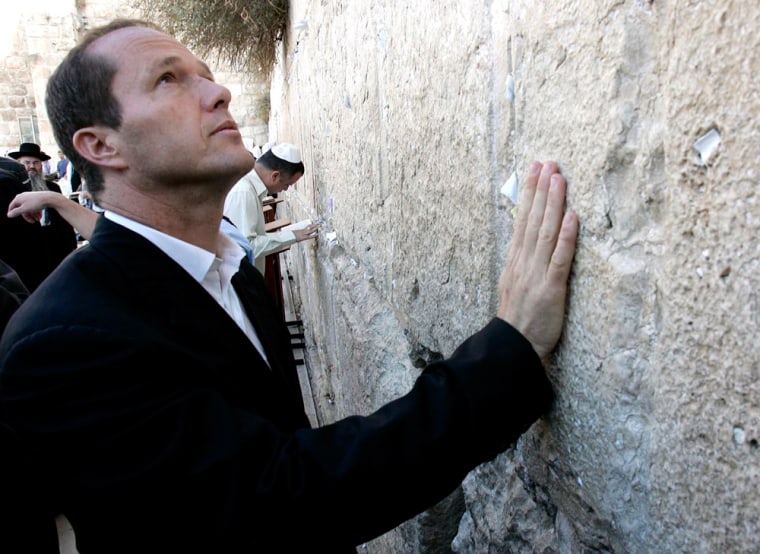A secular businessman appeared to have won an election for mayor of Jerusalem Tuesday against a powerful ultra-Orthodox Jewish leader in a race that again exposed the deep divide between religious and secular Israelis.
A telephone poll of voters conducted by Israel TV, released just after voting ended at 10 p.m. (2000 GMT), showed that the secular candidate, Nir Barkat, defeated the ultra-Orthodox contender, Meir Porush, by a margin of 50 to 42 percent. Two minor candidates split the other 8 percent. However, such polls have sometimes proved inaccurate in the past.
Israelis went to voting stations around the country, picking mayors and city councils, but local issues and strong independent candidates overshadowed clashes between the major parties three months before national elections. In Jerusalem, the three largest parties failed to field candidates for mayor for the first time, leaving the race to representatives of two of the city's three distinctive and often squabbling groupings.
Official results expected Wednesday
Porush, 53, an imposing figure on the ultra-Orthodox national political scene for years, his trademark bushy red beard going gray now, ran an intense campaign against Barkat, a venture capitalist in his second try to win the mayor's job.
Official results were expected early Wednesday. Leading candidates needed to win 40 percent of the vote to avoid a runoff in two weeks.
In an incident of violence in Jerusalem, police broke up a demonstration by extremist ultra-Orthodox Jews who do not recognize Israel. Police said they were trying to prevent people from voting.
The appearances of the two rivals underlined their differences. Porush wears a long, black coat and large, black skullcap, as do the tens of thousands of ultra-Orthodox Jews he represents. The bareheaded, casually dressed Barkat reflects the embattled, dwindling secular Jewish residents of Jerusalem.
With a high birth rate and government financial support, ultra-Orthodox Jews are a growing proportion of Jerusalem's population, while many secular Jews are leaving the city because of their lack of control and rising municipal tax rates.
High turnout among secular voters
Uri Lupoliansky rode that trend in his victory in 2003, becoming the first ultra-Orthodox Jew to serve as Jerusalem's mayor, succeeding Ehud Olmert, now Israel's outgoing premier. Israeli media reported that a higher than usual turnout Tuesday among secular voters helped Barkat.
Left out was the third sector — Jerusalem's Palestinian residents. They make up a third of the city's population of 750,000 and have the right to vote after Israel annexed their section of the city in 1967. But most boycott instead of tacitly recognizing Israeli control by taking part in city elections. Palestinians claim their section of Jerusalem as the capital of the state they hope to create.
The mayor of Jerusalem has no official standing in Israeli-Palestinian negotiations, but one area of agreement between Porush and Barkat — and the other two candidates who are seen as having little chance of victory — is opposition to division of Jerusalem as part of a peace deal.
Instead, the two leading candidates favor building thousands more apartments for Israelis in the disputed part of the city, angering Palestinians.
Challenges await new mayor
More mundane issues face the incoming mayor. Financially strapped because a large proportion of its residents are poor, downtown Jerusalem has become shabby and dirty. In the past year it has also become a dusty construction zone, with the building of a light rail tying up traffic and angering residents and merchants alike.
In Tel Aviv, two-term incumbent Ron Huldai was trying to fend off Dov Khenin, 50, a member of Israel's parliament from the Communist party Hadash. While Khenin is Jewish, his party is especially popular with Arab voters because of its calls for Palestinian and Arab rights.
But Khenin's strong environmental stand rather than his views on Arab-Jewish relations have won him popularity in Tel Aviv, Israel's commercial and cultural center, home to 390,000 people.
Huldai, 64, is a former general, fighter pilot and high school principal with a pro-business bent.
